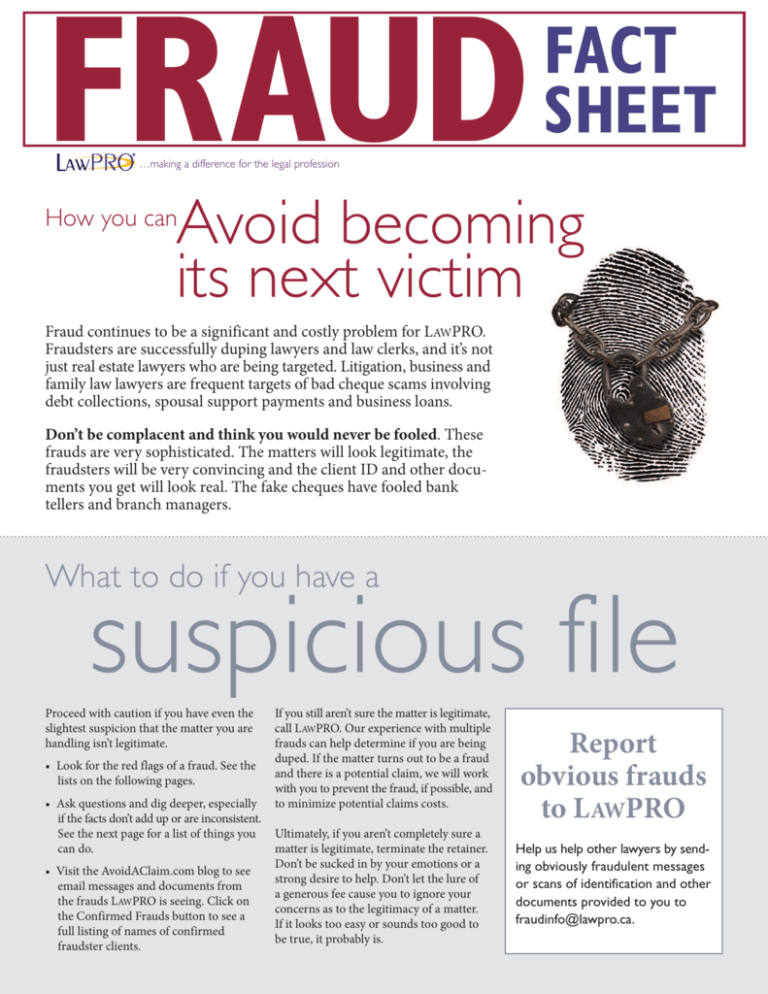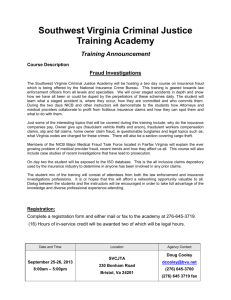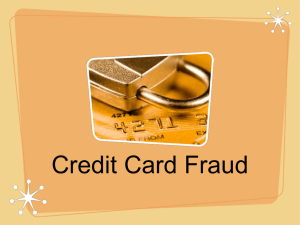
FRAUD
FACT
SHEET
…making a difference for the legal profession
Avoid becoming
its next victim
How you can
Fraud continues to be a significant and costly problem for LAWPRO.
Fraudsters are successfully duping lawyers and law clerks, and it’s not
just real estate lawyers who are being targeted. Litigation, business and
family law lawyers are frequent targets of bad cheque scams involving
debt collections, spousal support payments and business loans.
Don’t be complacent and think you would never be fooled. These
frauds are very sophisticated. The matters will look legitimate, the
fraudsters will be very convincing and the client ID and other documents you get will look real. The fake cheques have fooled bank
tellers and branch managers.
What to do if you have a
suspicious file
Proceed with caution if you have even the
slightest suspicion that the matter you are
handling isn’t legitimate.
• Look for the red flags of a fraud. See the
lists on the following pages.
• Ask questions and dig deeper, especially
if the facts don’t add up or are inconsistent.
See the next page for a list of things you
can do.
• Visit the AvoidAClaim.com blog to see
email messages and documents from
the frauds LAWPRO is seeing. Click on
the Confirmed Frauds button to see a
full listing of names of confirmed
fraudster clients.
If you still aren’t sure the matter is legitimate,
call LAWPRO. Our experience with multiple
frauds can help determine if you are being
duped. If the matter turns out to be a fraud
and there is a potential claim, we will work
with you to prevent the fraud, if possible, and
to minimize potential claims costs.
Ultimately, if you aren’t completely sure a
matter is legitimate, terminate the retainer.
Don’t be sucked in by your emotions or a
strong desire to help. Don’t let the lure of
a generous fee cause you to ignore your
concerns as to the legitimacy of a matter.
If it looks too easy or sounds too good to
be true, it probably is.
Report
obvious frauds
to LAWPRO
Help us help other lawyers by sending obviously fraudulent messages
or scans of identification and other
documents provided to you to
fraudinfo@lawpro.ca.
Bad cheque scams
Fraudsters retain the firm on a contrived legal matter so that they
can run a counterfeit cheque or bank draft through the firm trust
account and walk away with real money. These contrived matters
Common types of bad
cheque fraud:
Business loan/inventory
purchase fraud
• Targets business lawyers.
• Fraudster will ask you to handle a loan.
• Loan proceeds are coming from fake
lender.
Spousal support collection fraud
• Targets family lawyers.
• Fraudster will ask you help with collection
from ex-spouse, often further to a
“collaborative settlement agreement.”
will look real. The fraudster will provide extensive and very real
looking ID and documents. When the bad cheque or draft bounces,
there will be a shortfall in the trust account.
Red flags
Digging deeper
These are the common red flags that indicate
that a matter is a fraud. Some of these may
occur on legitimate matters, but if many
appear on the same matter you should heed
the warning signs.
Take these steps to cross-check and verify
information provided to you by the client.
• Initial contact email is generically
addressed (e.g., “Dear attorney”) and
BCC’d to many people.
• Sender email address is different from
address mentioned in body of the email.
• Client uses one or more email addresses
from a free email service (e.g., Gmail,
MSN, Yahoo!), even when the matter is
on behalf of a business entity.
• Client is new to your firm.
• Ex-spouse will pay up with little or no
pushing.
• Client is in a distant jurisdiction.
Debt collection fraud
• Client prefers email communication due
to time zone differences.
• Targets litigators.
• Fraudster will ask for help with a
debt collection.
• Debtor will pay up with little or
no pushing.
• Client shows up and wants the matter
completed around banking holidays.
• Client provides only a cell number.
• Client is in a rush – and pressures you to
“do the deal” quickly.
• Client and others involved don’t seem
concerned if shortcuts are taken.
• Cross-check names, addresses, and
phone numbers of the client and other
people/entities involved in the matter on
Google and other search engines. While
the real names of people or businesses
may be used, contact information on fake
documents will put you in touch with
people in cahoots with the fraudsters.
• Do reverse searches on phone numbers.
• Look up addresses using Street View in
Google Maps.
• Ask your bank or the issuing bank to
confirm the branch transit number and
cheque are legitimate.
• Call the entity making the payment or loan
and ask if they are aware of the transaction.
• Contact the company to confirm it is
expecting debtor’s payment or business
loan.
• Hold the funds until your bank confirms
the funds are “good” by contacting the
other bank, and have the bank confirm,
in writing, that it is safe to withdraw
from the deposit.
• Client is willing to pay higher-than-usual
fees on a contingent basis from (bogus)
funds you are to receive.
• Despite the client stating a lawyer is
needed to help push for payment, the
debtor pays without any hassle.
• Cheque or bank draft arrives at your
office in plain envelope and/or without
covering letter.
Get fraud updates from
AvoidAClaim.com blog
For immediate updates on fraud and
claims prevention, subscribe to the
email or RSS updates from LAWPRO’s
AvoidAClaim blog.
• Cheque is drawn from the account of an
entity that appears to be unrelated (e.g., a
spousal arrears payment from an insurance company or travel agency).
• Payment amounts are different than
expected or change without explanation.
• Client instructs you to quickly wire the
funds to an offshore bank account or third
party that appears unrelated to the matters.
www.lawpro.ca
Real estate scams
Identity theft fraud
Flip (value) fraud
• Client uses fake ID to assume identity of existing property
owner (or director/officer of corporate owner).
• Client says she or he is a real estate agent or in business of
buying and selling.
• Client sells or mortgages the property, or discharges mortgage
from title, then gets new (often high-ratio) mortgage from
another lender.
• Client promises high fees, lots of business for quick turnaround
on deals. (Short turnaround means proper searches aren’t
conducted.)
• Paperwork looks in order; no encumbrances on title, but one or
more recently discharged mortgages.
• Once transaction closes, client flips property to accomplice
(e.g., appraiser and/or mortgage broker) for much higher value.
• Client in a hurry and accommodating: May discourage house
inspection or appraisal.
• Lender issues mortgage on inflated property value.
• Transaction closes, you pay proceeds to client who makes a few
mortgage payments, then disappears with funds.
• Lender sues you for value of mortgage.
• Client uses mortgage proceeds to pay initial purchase price,
splits excess funds with accomplices.
• Client makes a few payments, and then disappears with funds.
• Lender sues you for excess/inflated value of mortgage.
Red flags: The client
Red flags: The transaction
• Does not care about property, price, mortgage interest rate, legal
and/or brokerage fees.
• Repeat activity on single property or for single client.
• Only uses a cellphone number for contact.
• Cannot produce title documents, survey, reporting letter, tax or
utility bills.
• Rental and vacant properties especially vulnerable.
• Client buys and sells often, prefers to deal in cash.
• Property listing expired without sale (i.e., sale may be unregistered).
• Does not appear familiar with property.
• Frequent and quick mortgage discharges on property.
• Won’t permit contact with prior lawyer.
• New referral source sending lots of business.
• Client is “out of sync” with property – e.g., don’t appear educated/
affluent enough.
• “Rush” deals, often with promise of more.
• Client produces small deposit relative to price.
• Funds directed to third party with no apparent connection to
transaction.
• No amendments to Agreement of Purchase and Sale.
• Stranger who appears to control client attends to sign documents.
• Sale is presented as a “private agreement” – no agent involved,
or named agent has no knowledge of transaction.
• Municipality or utility companies have no knowledge of client’s
ownership.
TIP: BE ALERT
• Avoid having documents executed outside your office.
• Consider reviewing or discussing transaction with
another lawyer.
• Consider market trends in the transaction area.
www.lawpro.ca
• Client paying little or nothing from own funds.
• Unusual adjustments in favour of vendor, or large vendor-takeback mortgage.
• Use of counter cheques.
• Use of Power of Attorney.
More information on
protecting clients against real estate fraud
TitlePLUS® title insurance provides coverage
for your clients when they buy a home.
Through the OwnerEXPRESS® program,
TitlePLUS insurance also provides fraud
protection for clients who may have purchased a property earlier but did not also
secure title insurance protection on that
purchase.
TitlePLUS insurance provides fraud
coverage as follows:
• for frauds that may have occurred prior
to purchase (e.g., it turns out that the
vendor does not really have the right to
sell the property);
• if the property becomes a target of
fraud at a later date. This is part of
the post-Policy Date protection in the
TitlePLUS policy.
not yours, if someone must contact the
government to request that title be restored
to your name in the official records. (Please
refer to the policy for full details, including
actual terms and conditions.)
For more information visit
www.titleplus.ca under our "Products and
Services," and "Publications" tabs.
The TitlePLUS policy is underwritten by
Lawyers’ Professional Indemnity Company
(LAWPRO).
There is also a “duty to defend” in the
policy, which means that it is our problem,
Is the fraudster
in your office?
Not all fraudsters are strangers. Even partners,
associates, law clerks or other employees may
turn to fraud because of financial pressures
from a divorce, failed business venture,
or other personal crisis.
More information
on fraud
• Someone never takes vacation or sick
leave, works overly long hours, or
refuses to delegate work.
LAWPRO has assembled a variety of
articles, resources and tips on fraud and
how to avoid being its next victim. To
learn more about what fraud looks like
and how to prevent it from happening
to you and your firm, go to:
www.practicepro.ca/fraud.
Red flags
LAWPRO’s
enhanced coverage
for counterfeit
certified cheques,
bank drafts
As of January 1, 2010, the LAWPRO policy
provides some overdraft protection to
lawyers in relation to their trust accounts
where liability for the overdraft results
from the handling of a counterfeit certified
cheque or counterfeit bank draft in the capacity of a practising lawyer. This enhanced
protection is subject to several conditions
and limitations. Review the FAQs
(www.lawpro.ca/FAQs) on the LAWPRO
website to make sure you understand this
coverage and the extra steps you must take
to quality for it.
MASTHEAD
President & CEO:
Kathleen A. Waters
• A firm member undergoes a sudden
change in lifestyle or change in
temperament.
This information bulletin is published by LAWPRO to provide
lawyers and law firm employees with an overview of some common
types of fraud, and to provide practical advice on ways to minimize
their exposure to fraud-related claims.
• The firm receives mail for a corporation
for which no client file is opened or
billed, or minute books are kept in the
lawyer’s office instead of with the
corporate law clerk.
www.lawpro.ca
Tel: (416) 598-5800 or 1-800-410-1013
Fax: (416) 599-8341 or 1-800-286-7639
• Unusual patterns such as a sudden
increase in payments to a person or
credit card company or government, or
complaints about slow payment from
suppliers or clients, or an increase in
written-off work in progress (WIP).
Managing Editor:
Dagmar Kanzler
dagmar.kanzler@lawpro.ca
Editor/writer:
Dan Pinnington
dan.pinnington@lawpro.ca
Design & Production:
Freeman Communications
studio@freemancomm.com
Disclaimer:
The material presented does not establish, report or create the standard
of care for lawyers. The material is not a complete analysis of the topics
covered, and readers are encouraged to conduct their own appropriate
legal research.
©
For more information see “Fraud on
the Inside: What to do when partners,
associates or staff commit fraud” at
www.lawpro.ca/magazine.
2011 Lawyers' Professional Indemnity Company (LAWPRO).
All rights reserved.
® Registered trademark of Lawyers' Professional Indemnity Company.
Printed on recycled paper. This product can be recycled.
B6/2011








